View current page
...more recent posts
Bodenstandig 2000, who performed this week at Deitch, bring terrific entertainment value to the greater but potentially somewhat boring cause of open-source, command-line principles. Combining acapella singing, furious real time keyboard playing, spastic, ironic Prodigy-style dance moves and a razor sharp ear for the nuances of various hard-pumping electronic dance genres (if only to proudly translate them into 8-bit, that is, lo fi, "chiptunes"), the duo repeatedly bowled over the audience Wednesday night. Their simultaneous video-projection of a defiantly non-graphic sequencer interface reminds you that the music you're hearing is a steady stream of numbers.
Dedication to old gear and pure hacking vis a vis current proprietary software systems in some ways recalls the rock purists of yore who insisted that only black Delta blues musicians had integrity vis a vis British cover bands, or that 3-chord garage bands always had the edge over prog rock & fusion [was it really necessary to throw out the baby of Canterbury and electric Miles with the bilge of Kansas and Spyro Gyra?]. This kind of essentialism has Occam's razor logic on its side but can also grow stuffy and cult-like. Bodenstandig aren't stuffy, they're funny as hell, but their website(s) are defiantly retro with all-black screens, a simulated UNIX interface, and occasional hectoring about nerdy things like the "right" way to resize images.
Their music and live show present the clearest, most hilarious, most persuasive argument for the absolutist position, but there are other positions. Instead of braving the minefield of newer musicmaking software with all its copyright limitations, commercial agendas, hidden manipulations of the artist, and potential for quickly dating cheesiness, they hold the line for older, more clearly articulated concepts of integrity. This means either no change, or that music must backtrack and take the road not taken, into a parallel universe where there is no Microsoft, no Apple, and all musicians know code.
In defense of commercial software, the communities that develop around a particular bit of gear or program (e.g., Emagic, Native Instruments) apply open-source tenets in the form of forums and message boards where the software developers get ideas and criticisms from users, and then modify products in the next version. This isn't just corporations faking the Linux model; the rethinking process is ongoing and happens at internet speed. Ultimately chores of creation and fabrication are apportioned to the people who do each best, as opposed to demanding that every creator be both artist and scientist. Also, much of the music that Bodenstandig so adeptly imitates (especially jungle) originated in a commercial software environment, often through undiscovered uses or misuse of products by musicians. Truly original, innately 8-bit music would probably take years to assimilate and would not necessarily please crowds.
UPDATE: One point of clarification: by "commercial software environment" I also mean to include the software in so-called hardware synths and samplers. For further discussion and clarification, please see the comments and later posts.















These need to be in synch to look their best (i.e., not viewed in Safari). Single .GIF from the mysterious http://castlezzt.net (caution: massive page load) via mbs. More excerpts to come.
Ridiculously dark photos from "Low Level Allstars," a performance night at Jeffrey Deitch curated by Cory Arcangel and Radical Software Group, highlighting demoscene graphics and new music made with old computers. Below: crowd pleasers Bodenstandig 2000, from Germany, with their beautiful, all numerical MusicMon interface in the background. The sounds they wring out of three square wave generators and practically no memory-load relative to current music simply bugger the mind. Their 8-bit drum and bass number would have had any club audience in the world screaming "rewind!" A mock rock video featuring Bernhard Kirsch (right) zipping through city streets on his scooter (you had to be there) also drew shouts of adulation. (Update: from his website it appears he designs these scooters and this was a promotional video? Sorry, my German is nonexistent.)
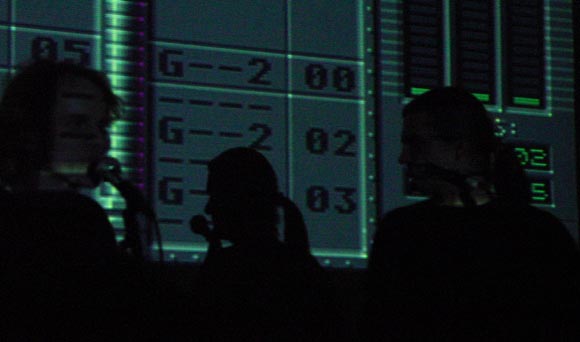
Performing earlier were Nullsleep of the 8bitpeoples crew, who specializes in that tuneless Gameboy stuff Malcolm McLaren likes, followed by Tree Wave (below), previously discussed here. Excellent drone-rock, as in John Cale, Faust, Kevin Shields, all done with Ataris and other vintage computers, and a hacked dot matrix printer. Lauren Gray's vocals work best when woven into the restricted tonal range of the music, as on "Sleep," a song as haunting live as on CD. The more expressive she is the more incongruous. On their cover of Eno's "Needles in the Camel's Eye" she almost sounded like a country singer--which turned out to be a very odd and good choice, though. The song should always be done that way!
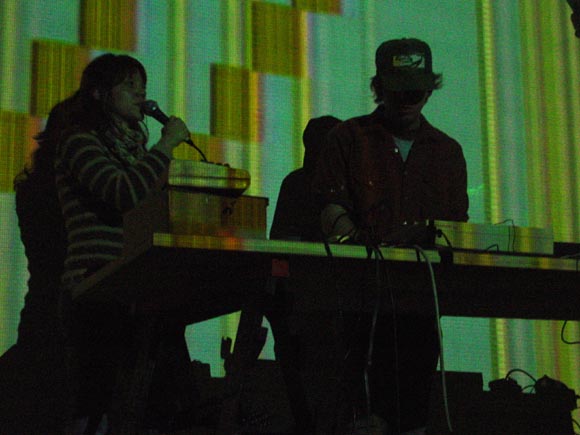
The event included artists' talks and some fairly subtle music but the audience topped the charts for rudeness, issuing a stream of loud chitchat that didn't stop the entire night. Maybe it was the cases of free Red Stripe, or possibly the same swine that invaded vertexList a few months back moved to Deitch en masse. I mean, boogeying during Bodenstandig doesn't offend but there's a time to stand still (or sit) and shut up: like, when there are people on the stage talking into microphones. The worst club in Baltimore wouldn't treat performers this poorly. Art poseurs and moronic Deitch scenesters, kiss my ass! Okay, I feel better.
A final note: you can catch the same lineup of performers again tonight (Thursday) from 7 -10 pm. Also in photos: Dragan Espenschied (top photo, left); Paul Slocum (bottom photo, right). More thoughts on Bodenstandig here, here, and here.


"Strychnine Express" [mp3 removed] (my acid techno track; strychnine molecule from google images)






























Audio Sketchbook
"Demo Primeval" [mp3 removed]
"Mr. Arkadin" (Club Mix) [mp3 removed]
"Apres-Midi" [mp3 removed]
"Apres-Midi (Clicks)" [mp3 removed]
"Desultory Arcade" [mp3 removed]
"Reel for Omniverters (Baroque)" [mp3 removed]
"Fangasia" [mp3 removed]
"Bass Iterator" [mp3 removed]
"Demo Primeval" is a mashup of demo samples for two products: the Beatburner and the Mutator, with some gratuitous metalizing added. Some of the tunes are MIDI drum files downloaded off the Net and used to trigger regular, tonal notes in a synth or sampler. A couple of tracks are reworkings of older tunes using better instruments. "Bass Iterator" is the sampler pretty much playing itself: all that dramatic stereo panning just started happening. I call this a sketchbook but these are all finished, if fairly modest, pieces.
Delirious Hong Kong: Check out Michael Wolf's photos of architecture there. Please tell me these are photoshopped:






(another hat tip to Lorenzo Bustillos)
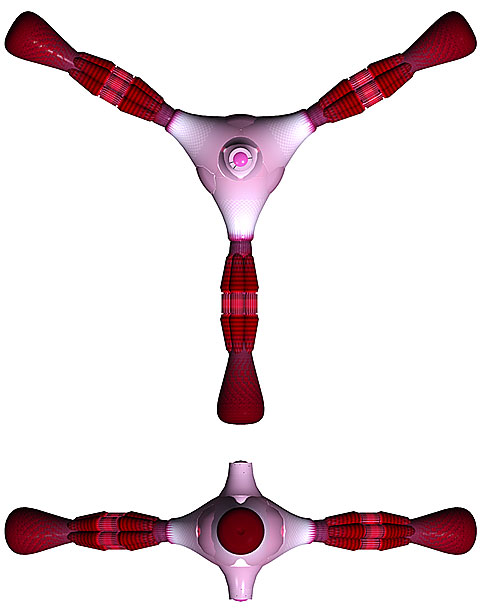
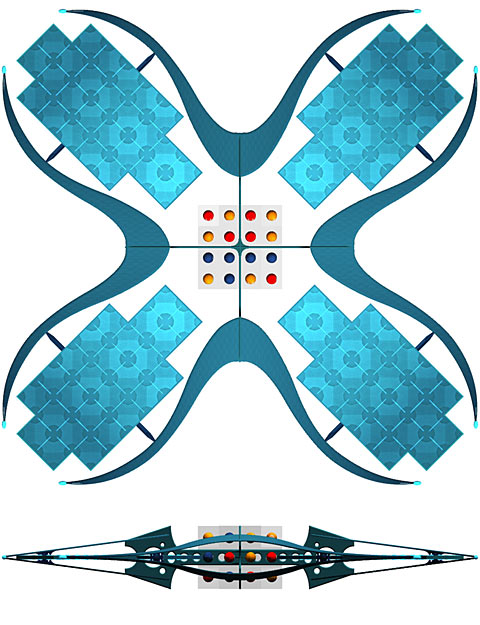
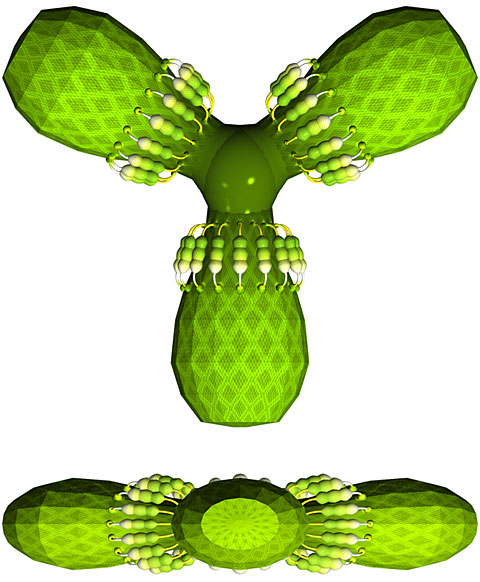
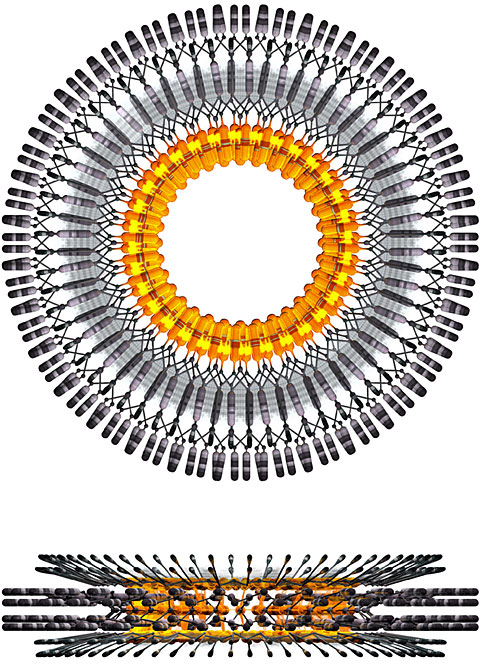
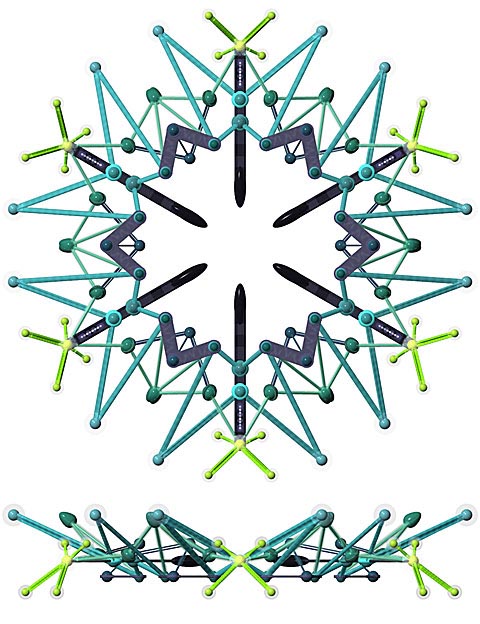
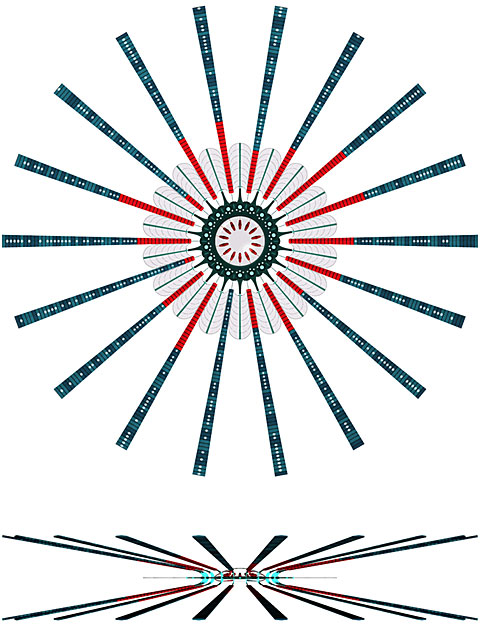
Images from the spacebloom website, teaser for a high concept book about imaginary space flora. I'm not that into the somewhat giddy narrative side of it ("The fbloom prototype consisted of four solpans, two alseco betteries, a conventional emag propulsion unit, and a UPU, all of which were mounted around a tubular frame that housed the centrepiece: the unimbler-based matter processor"), and prefer these elegantly designed computer images against a white background to seeing them superimposed against starscapes. So I guess this is another minimalist remix. (Hat tip to Lorenzo Bustillos)
